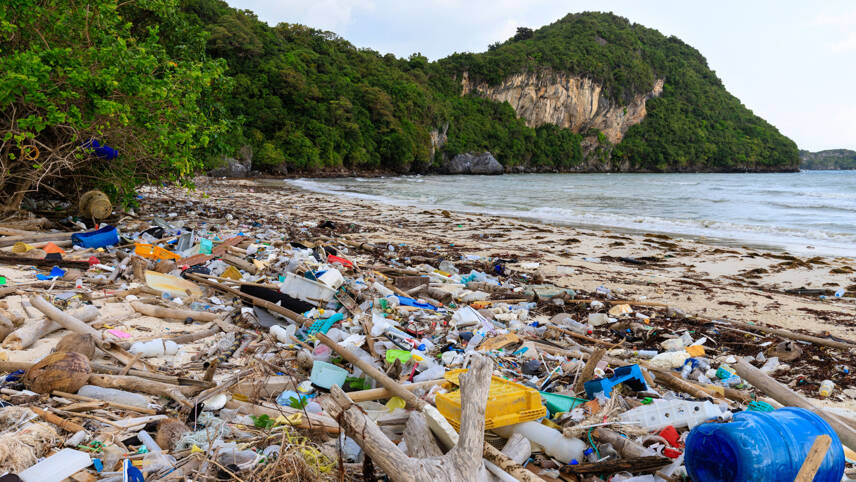Register for free and continue reading
Join our growing army of changemakers and get unlimited access to our premium content

The guide is free to download for edie users
The OECD published the key findings from its forthcoming ‘Global Plastics Outlook: Policy Scenarios to 2060’ report late last week. The report looks at current levels of policy ambition around tacking plastic waste and pollution on national, regional and international levels, mapping out likely changes through to 2060.
The headline finding is that, unless “radical” changes are made to policy frameworks in the coming years, the amount of plastic waste produced globally is likely to almost triple by 2060, against a 2019 baseline.
While the share of plastic waste that is successfully recycled would increase significantly, from just 9% in 2019 to 17% in 2060, the OECD is warning that improvements in recycling systems will not be enough to keep pace with increased plastics production and consumption.
The growth in production and consumption will be fastest in developing and emerging countries in Africa and Asia, the report states. But it also highlights that OECD countries will still produce much more plastic waste per person (238kg per year on average) in 2060 than non-OECD countries (77kg).
With increased production and consumption set to outpace improvements in recycling, around 20% of plastic waste produced in 2060 is likely to be incinerated and 50% sent to landfill sites. The remainder will end up in uncontrolled dumpsites or open pits, or leaking into nature. Indeed, the report forecasts that global plastic leaks into the environment will double to 44 megatonnes by 2060. Leaks into lakes, rivers and oceans will accelerate more rapidly than leaks on land, according to the report.
The OECD highlights in the report that plastics of various sizes are now leaking into marine habitats. The report warns of the dangers of larger debris, known as ‘macroplastics’, such as abandoned fishing gear, as well as litter and microplastics. On the subject of microplastics, the report calls industrial plastic pellets – nurdles – and plastic shedding from synthetic textiles and tyre wear “serious concerns”.
The new report will be published in full later this month. It builds on the OECD’s major stocktake of plastic production, consumption, pollution and recycling to date, first published in February. That initial report outlined how plastics production doubled in volume between 2000 and 2019, outpacing overall economic growth by almost 40%.
Policy interventions
“If we want a world that is free of plastic pollution, in line with the ambitions of the United Nations Environment Assembly (UNEA), we will need to take much more stringent and globally coordinated action,” said the OECD’s Secretary-General Mathias Cormann, referencing the global plastic treaty agreed in March.
The draft treaty covers all stages of the plastics lifecycle – meaning that nations will need to take action on plastic design and production as well as improving recycling systems. More specific requirements for each nation will be confirmed through to the treaty’s planned finalisation in 2024.
Cormann said that the OECD’s policy recommendations for aligning the world with the treaty are “concrete” and “could significantly curb – and even eliminate – plastic leakage into the environment” – provided that nations collaborate internationally and set extremely high ambitions in and of themselves.
The body is recommending that nations tighten their extended producer responsibility (EPR) schemes, forcing plastic producers to design items that are more durable, easier to recycle, reusable or repairable, and to contribute financially towards recycling. It is also floating targets for recycled plastic content in new plastic products, supported by taxes on plastics – particularly non-recycled and non-recyclable items.
At later stages in the plastics lifecycle, the OECD recommends financial incentives for consumers and businesses to reuse and repair plastic products. It also emphasises how these actions need to be taken in tandem with efforts to improve waste management infrastructure and litter collection rates.
Here in the UK, a tax on plastic packaging containing 30% recycled content or less was recently imposed. Other policy changes, including changes to EPR rules and the introduction of a national deposit return scheme (DRS), have faced strings of delays due to Covid-19. Consultations are now underway but many of the changes promised in the 2018 Resources and Waste Strategy will not come into force until 2023 or 2024.
The only part of the UK with a DRS at present is Scotland. Last week, Scotland implemented a ban on the sale and distribution of a selection of “problematic” single-use plastics, including straws, cutlery, polystyrene plates and food containers and plastic drinks stirrers. Businesses found to be distributing these items will be fined up to £5,000 by their local council.


Please login or Register to leave a comment.